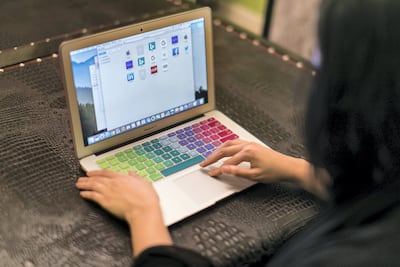LATEST: Inside UAE’s most expensive school, from Dh200,000 fees to esports classrooms
Eight out of 10 university students in the UAE spend more than seven hours a day online, a new report has revealed.
Researchers suggested devoting such long periods of the day to using internet applications could have a “negative effect” on academic performance.
The study, which surveyed 600 male and female students on their internet habits, found 84 per cent were online for seven or more hours daily.
A further 14.9 per cent used online platforms for between one and seven hours, with only 1.5 per cent having less than one hour of screen time per day.
The findings were published in the Intercontinental Journal of Social Sciences on May 20.
The report was authored by Ayman Alkhady, head of the academic guidance department at the Kuwaiti Embassy in Jordan, who has published other studies on social media and higher education in the region.
Online activities included using social media, watching on-demand films and listening to music, according to the study.
TikTok was by far the most popular social media site, with 69.7 per cent of respondents saying that it was their favourite.
WhatsApp was the favourite of 13.5 per cent, Snapchat of 9.5 per cent, Facebook of 4.8 per cent and Twitter, now known as X, of 2.5 per cent.
Concern over online use

“University students spend long hours using internet applications for enjoyment, such as listening to music and watching movies for more than seven hours a day, and they mostly do not use social media for academic purposes,” the study said.
“The results also showed that prolonged use of internet applications has a negative effect on the academic performance of university students.”
The association between long hours online and poor academic performance has been identified in other studies, such as one from 2015 by the University of Cambridge, which found that each extra hour spent online per day was associated with an average of two grades lower at GCSE, the examinations taken by 16-year-olds.
Dr Sari Castrén, a researcher and clinician at the Finnish Institute of Health and Welfare in Finland, has researched the issue in her home country.
“There are various ways how this usage – being on the internet constantly – can affect your academic performance, with direct links to cognitive function,” she said. “The linkage was there to school burnout – it affects academic performance.”
Other research, undertaken by Swansea University in Wales and the University of Milan in Italy and based on 285 students, found that those who reported greater levels of internet addiction were more worried about forthcoming exams and found organising their studies harder.
Digital detox required
One of those involved in that study, Prof Phil Reed of Swansea University, said that for youngsters in general, overuse of digital technology “can be very, very damaging”.
“For older students or college-age students, it really depends how you’re using the internet,” he said. “You can imagine when someone is using the internet very, very productively to get lots and lots of information and then is stepping away from the internet to process that information, that can be very, very helpful. But you have to have that time away from the internet.”
Aside from being a useful source of factual information, the internet – and social media in particular – may also, Dr Castrén said, “increase social support and social relationships”.
“It can be good or bad,” she said. “There’s an ongoing debate among researchers about social media and the extent to which it may be beneficial or harmful.”
To get the most from the internet, students are advised to limit their time online, but Prof Reed described the issue of how many hours per day to recommend as “a really tricky one”.
“I would probably say, given the literature and the world the way it is, somewhere between one and two hours digital use per day is enough,” he said.
“It’s a fair chunk of the day for somebody … It depends why it’s being used.
“It’s like drinking coffee: you wouldn’t do it before you go to bed. It’s when you use it and how. If you want to put a figure on it, no more than two hours.”
From her consultations with patients, Dr Castrén knows that the hours people spend per day on the internet can easily creep up.
“My patients are telling me, ‘I started scrolling on the phone, then I found myself sitting in the same corner of the sofa for four hours.’ People lose time, they get immersed in the social media world,” she said.
“The outcome is that these things they were planning to do – cleaning or doing academic work or spending quality time with their spouse – that time was missed by using social media.”
How to switch off
There are, however, a number of things that can be done to reduce the risk of people using the internet excessively.
The UAE study recommends that workshops are arranged within universities to “demonstrate to students the harm of using the internet for long periods on their academic achievement”. Outside experts could be invited in to highlight the dangers.
Students should also, the paper suggests, be introduced to educational and academic websites that may be helpful for their studies.
From her work, Dr Castrén has a number of suggestions on how to avoid slipping into excessive internet use.
“You could change the screen from colour to black and white when you’re studying,” she said. “You could move the social media app to a less visible place in the screen so it’s not there … those apps that are hooking you in.”
Another idea is, she said, to set up an alarm that goes off after 15 minutes’ or half an hour’s use of social media.
“These are the tips that I’m working on with my clients,” Dr Castrén said.


